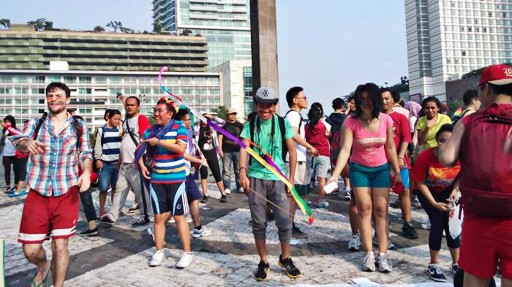
Recent cases of persecution set back LGBT rights advocacy
by Ramadani SaputraAt a time when members of the Lesbian, Gay, Bisexual and Transgender (LGBT) community should be able to celebrate their existence without fear of reprisal, two recent cases of persecution have laid bare the cruel reality people in the community still face in Indonesia, rights advocates have said.
The murder of Mira, a transwoman who was burned to death by a mob in Cilincing, North Jakarta, and a widely criticized prank by YouTuber Ferdian Paleka, who delivered “care packages” full of garbage to transwomen in Bandung, West Java, served as reminders that many challenges remain for those advocating for the rights of LGBT people.
The two cases occurred in the month leading up to the global commemoration of the International Day against Homophobia, Transphobia and Biphobia (IDAHOT) on May 17, which saw a muted reception owing to the effects of the COVID-19 outbreak.
Observers have noted how the general public’s reaction to the two cases has been skewed, with more people perceived as having flocked to social media to condemn the prank than the murder. In the latter case, the North Jakarta Police even moved to absolve the suspects by saying they had no intention to kill.
The public's selective attention to LGBT rights issues, including politicians who have sought to use such issues to gain public support, has only compounded the struggles the community faces in Indonesia, the National Commission on Human Rights (Komnas HAM) has said.
Komnas HAM commissioner Beka Ulung Hapsara said that stigma and discrimination against the LGBT community was a “gargantuan struggle” that would be difficult to resolve without the support of many stakeholders.
“[It will be hard to win the battle] if the LGBT community only has support from Komnas HAM, Komnas Perempuan [National Commission on Violence Against Women] and other civil society organizations,” Beka said in a recent virtual discussion on hate speech against marginalized communities.
“The stigma and discrimination is so deeply rooted in our society that many think of it as a given. It is quite the challenge to face alone.”
Discrimination against the LGBT community is still widespread in Indonesia, with the Indonesian Psychiatrists Association (PDSKJI) classifying homosexuality, bisexuality and transsexualism as mental disorders that can be cured through proper treatment.
The Komnas HAM commissioner said there had been a stark change in public perception toward the community, highlighted by the lack of representation on national television that came as a result of intolerant groups and agencies like the Indonesian Broadcasting Commission (KPI) that tried to limit the community’s movement.
Just a decade or two ago, national broadcasting was considered a safe space for the LGBT community, with primetime programs like the Dorce Show – a variety show hosted by the openly transwoman Dorce Gamalama – pulling in viewers during a successful four-year run.
Local sitcom Bajaj Bajuri, which starred actress-cum-politician Rieke Diah Pitaloka, even casually depicted a gay character in one episode that recently attracted attention on Twitter.
Even the Nia Dinata-directed movie Arisan! from 2003, a cult classic depicting the lives of gay urbanites in Jakarta, managed to spawn a sequel and a TV series spin-off on local broadcaster ANTV. The original movie has also found a new generation of viewers on streaming service Netflix.
But the tide has shifted in recent years to more conservative programming, which has fueled even more misperceptions about the LGBT community in Indonesia.
Advocacy has become even more complicated by the fact that many victims of discrimination are reluctant to report their cases, said Citra Farera of Indonesian Transgender Network (JTID).
“The [common] perception is that LGBT organizations exist because we want to legalize same-sex marriage, but what we actually do is far from that,” she said.
“What we are fighting for is our basic rights as human beings, such as the right to live and to work.”
At a time when the COVID-19 pandemic has obliterated many people’s incomes, Citra said the transgender community faced an even greater struggle for survival, as many had lost their jobs.
“Our fellow transwomen are experiencing difficulties in accessing public services like getting an ID card,” she said.
“[The effects can be seen] during this pandemic, where they are unable to receive government assistance as they don’t have any identification in the first place.”
Komnas HAM’s Beka said the government should acknowledge the right of the LGBT community by reaffirming the importance of the Yogyakarta Principles, signed in 2006.
“The Yogyakarta Principles is a recognized document that is used as reference when there is a state policy that has the potential to discriminate against our LGBT friends,” he said, adding that all states must comply with the principles.
The Yogyakarta Principles are the first set of international principles on the application of international human rights law in relation to sexual orientation and gender identity.
They include the right to live, the right to privacy and the right to work, and were further reinforced in 2017 with 10 additional principles such as the right to state protection and the right to protection from poverty.
The principles were formulated by a group of 29 international human rights experts, including the United Nations High Commissioner for Human Rights and other independent UN experts.